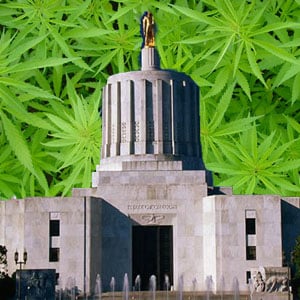 OCTA Officially Makes The Oregon Ballot
OCTA Officially Makes The Oregon Ballot
The Oregon Cannabis Tax Act (OCTA) turned in 59,850 signatures into the Oregon Secretary of State’s office on July 6 and enough signatures were deemed valid, according to the Oregon Secretary of State, Election Division’s official Twitter feed which tweeted, “Initiative Petition # 9 relating to marijuana has qualified for the Nov. ballot.”
Oregon will join Washington and Colorado in voting to end cannabis prohibition this November. After the turn-in on July 6, OCTA supporters were confident of making the ballot. They turned out to be right and it is great that their hard work and dedication paid off.
“We believe we’re going to make it easily,” said Paul Stanford, OCTA co-chief petitioner, was quoted by Reuters after the signature turn in. Stanford has been working tirelessly on the measure for several years. OCTA would completely decriminalize personal use of cannabis by adults and establish a commission to regulate sales. The proposal would also legalize industrial hemp production under state law.
“We believe marijuana, hemp, cannabis is the oldest crop purposely cultivated by human beings. it’s also the plant that produces more food, fuel, fiber, and medicine, than any other plant on this planet,” Stanford toldOPB.
Win or lose at the ballot box, it is a tremendous accomplishment to make the ballot. Oregon, Washington and Colorado will certainly make 2012 a monumental year for the cannabis reform community.
UPDATE: Press Release from the OCTA campaign:
July 13, 2012
CONTACT:
Roy Kaufmann
Oregon Cannabis Tax Act
*Common-Sense Marijuana and Hemp Regulation Makes Oregon Ballot *
Portland, Ore. — Moments ago, the Oregon Secretary of State’s Office
certified Initiative 9, the Oregon Cannabis Tax Act, which will appear as
Measure 80 on the Oregon ballot in November.
“Today is an historic day for Oregon and for the national movement for
common-sense marijuana policy,” said Paul Stanford, chief petitioner.
“Oregon’s long had an independent streak and led the nation on policies
that benefit the public good. Regulating marijuana and restoring the hemp
industry is in that tradition of independent, pragmatic governance.”
Measure 80, the Oregon Cannabis Tax Act, would regulate cannabis
(marijuana) for adults 21 years of age and older, with commercial sales
only through state-licensed stores. Ninety percent of tax revenue,
estimated at more than $140 million annually, would go to the state’s
battered general fund. Seven percent of tax proceeds would go toward
funding drug treatment programs, and much of the remaining revenue would be
directed toward kick-starting and promoting Oregon’s hemp food, fiber and
bio-fuel industries.
Regulating marijuana is also a more rational approach to decreasing crime
and improving youth and public safety.
“When the voters of Oregon pass this common-sense initiative, it will take
money right out of the pockets of violent gangs and cartels and put it into
the state’s tax coffers, where it can be spent on improving schools, roads
and public safety,” said Neill Franklin, the national executive director of
Law Enforcement Against Prohibition (LEAP) and a 34-year career
law-enforcement officer and veteran of narcotics policing in Baltimore.
“Plus, when cops like me are no longer charged with chasing down marijuana
users, we will be able to fully focus on stopping and solving serious
crimes like murders, rapes and robberies.”
And, taxing and regulating cannabis and hemp will create thousands of local
jobs, from agricultural jobs in Oregon’s hardest-hit rural counties to
manufacturing, engineering and professional services jobs around the state.
“We support Measure 80 because it’ll get middle-class Oregonians back to
work, it’s as simple as that,” said Dan Clay, president of the United Food
and Commercial Workers Union Local 555. “Whether it’s hemp biofuel
refineries on the Columbia River or pulp and paper mills in central Oregon,
hemp makes sense and fits Oregon’s renowned sustainability economy.”
“Whether you’re liberal or conservative, urban or rural, young or old,
regulating and taxing marijuana and hemp makes sense for Oregon,” Stanford
added.
To learn more about the Oregon Cannabis Tax Act, visit www.octa2012.org.
This article was re-published with special permission from the National Cannabis Coalition








